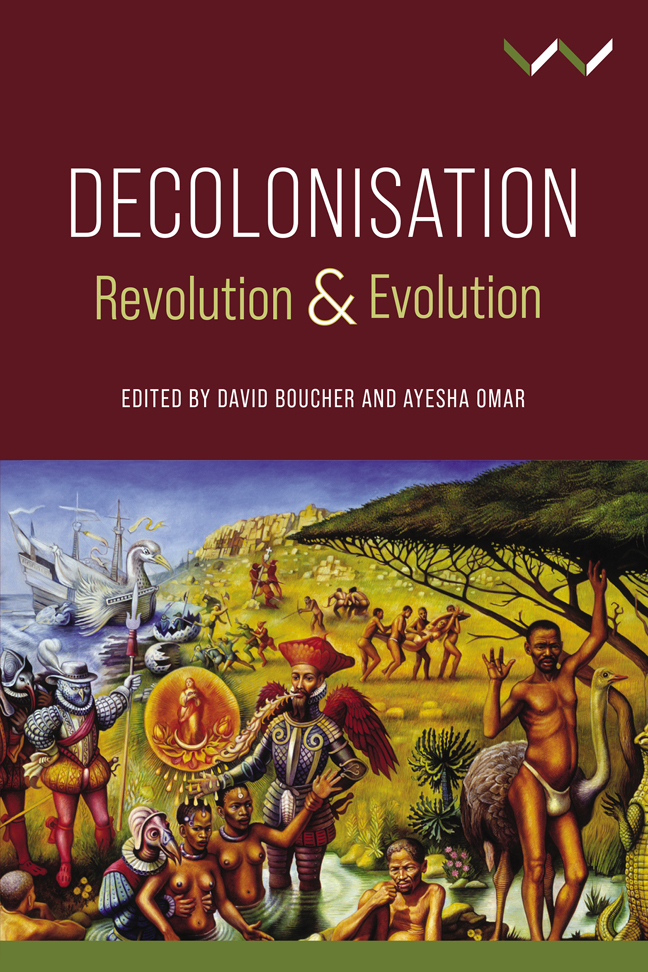Book contents
- Frontmatter
- Contents
- Acronyms
- Introduction: Decolonisation: Interdisciplinary Perspectives
- Chapter 1 The Invention of Blacks: Notes on Conquest, Fear and Time
- Chapter 2 The Decolonisation of Southern Africa: Historical Reflections
- Chapter 3 The Border of Trust at Kat River for Coloured Settlers, 1851–1853
- Chapter 4 Decolonisation and the Enduring Legacy of Colonial Borders in Africa
- Chapter 5 Fanon's Challenge: Identity, Recognition and Ideology
- Chapter 6 Beyond Redemption: Unsettling Progressive-Romantic Storyings of Colonial Injustice in Western Critical Thought
- Chapter 7 The Limits of Decolonisation and the Problem of Legitimacy
- Chapter 8 Decolonisation – Real and Imagined
- Chapter 9 Decolonisation and the Crisis of African Literature in the Twenty-First Century
- Chapter 10 Pedagogical Disobedience in an Era of Unfinished Decolonisation
- Contributors
- Index
Chapter 10 - Pedagogical Disobedience in an Era of Unfinished Decolonisation
Published online by Cambridge University Press: 01 March 2024
- Frontmatter
- Contents
- Acronyms
- Introduction: Decolonisation: Interdisciplinary Perspectives
- Chapter 1 The Invention of Blacks: Notes on Conquest, Fear and Time
- Chapter 2 The Decolonisation of Southern Africa: Historical Reflections
- Chapter 3 The Border of Trust at Kat River for Coloured Settlers, 1851–1853
- Chapter 4 Decolonisation and the Enduring Legacy of Colonial Borders in Africa
- Chapter 5 Fanon's Challenge: Identity, Recognition and Ideology
- Chapter 6 Beyond Redemption: Unsettling Progressive-Romantic Storyings of Colonial Injustice in Western Critical Thought
- Chapter 7 The Limits of Decolonisation and the Problem of Legitimacy
- Chapter 8 Decolonisation – Real and Imagined
- Chapter 9 Decolonisation and the Crisis of African Literature in the Twenty-First Century
- Chapter 10 Pedagogical Disobedience in an Era of Unfinished Decolonisation
- Contributors
- Index
Summary
Through a critical synthesis of the teaching of political and rhetorical practices that are often considered in isolation (that is, neo-imperial political assassinations, the corporate appropriation of Indigenous knowledges and critical development geographies), I make the case in this chapter for what I call pedagogical disobedience: an anticipatory decolonial development curriculum and praxis that is attentive to the perpetual simultaneity of violence and misappropriation within the colonial matrix of power. The chapter contributes to debates within international development and development geographies about the future of the discipline, given its neocolonial and colonial constitutions, and functions with a grounded attention to how this opens up possibilities for teaching praxis and scholarship in action.
ABSENCES IN THE CURRICULUM
As educators, we often prepare for teaching by gathering course material around a related set of themes and concepts. We cull determinedly from the reference lists of insightful journal articles and pore over abstracts, print-outs, book reviews, library shelves, TED Talks and more in search of comprehensive teaching materials that fit the pedagogical, curricular, creative and logistical needs of students. For decolonial students and educators in pursuit of the transformation of Eurocentric knowledge through Freirian ‘pedagogies of possibility’ (Freire 1997) and decolonising of the university by ‘teaching to transgress’ (hooks 1994), these moments of curricular preparation and structuring have richer significance. The creation of a critical decolonial syllabus necessitates a determined flexibility, a willingness to foster spaces of challenge in the classroom and a level of aptitude to coax students through the discomforts of unlearning. It also requires a sensitivity to the reproduction of Eurocentric, colonial, patriarchal and ‘whitestream’ (Grande 2003, 329) epistemologies within even critical and radical works in the social sciences. Eurocentric ideas and works sometimes make their way onto the pages of syllabi in careless or unintentional ways; this might be because of disciplinary norms or ‘disciplinary decadence’ (Gordon 2006), or pressures to prioritise standardisation (Nyamnjoh 2019), or the academic search algorithms that reproduce white patriarchal hypervisibility (Noble 2018) and make internet searches for alternatives more difficult. Decolonial transformation requires systematic ‘de-silencing’ (Rutazibwa 2019) within an academy at the service of bureaucratic classes and ‘benevolent empire’ (Chatterjee and Maira 2014, 7). In my first years of university teaching, I often began each process of creating course syllabi by looking online for examples of readings, concepts and materials that had worked for students in other universities.
- Type
- Chapter
- Information
- DecolonisationRevolution and Evolution, pp. 231 - 258Publisher: Wits University PressPrint publication year: 2023



